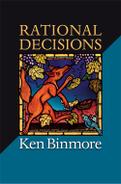Index
Absent-Minded Driver’s problem, 143
absolute zero, 161
Aesop, 5
affine function, 50
affine transformation, 16
Alchian, Armen, 13
all things considered, 139
Allais’ paradox, 43
alpha-max-min, 156
ambiguity, 113
ambiguity aversion, 168
Anscombe, Elizabeth, 119
Archimedean axiom, 41
argument by design, 127
asymmetric relation, 10
Aumann, Robert, 34, 119, 152, 172
axiom of choice, 79
Ayer, A. J., 21
backward induction, 32
Banach–Tarski paradox, 79
Bayesian, 95
Bayesian decision theory, 2, 95, 116
Bayesian epistemology, 137
Bentham, Jeremy, 8, 15, 38, 63
Bernoulli, Daniel, 37
Bernoulli, Nicholas, 37
Bernoulli trial, 105
Bertrand, Joseph, 86
best reply, 28
Billingsley, Patrick, 105
Bingham, Nicholas, 81
binomial distribution, 127
black box, 104
Blackburn, Simon, 21
Borel set, 78
Brams, Steve, 31
Broome, John, 64
Calude, Cristian, 99
cardinal utility, 16
Carnap, Rudolf, 95
causal utility fallacy, 19
Chaitin, Greg, 99
characteristic of a commodity, 47
Church–Turing hypothesis, 146
Clark, Michael, 17
closed set, 17
cluster point, 109
collective, 100
common knowledge, 139
compact set, 17
compound lottery, 40
concave function, 50
conditional probability, 83
Condorcet’s paradox, 61
convex function, 50
countable additivity, 81
counterfactual, 33
counterfactual event, 87
credence, 95
Damasio, Antonio, 8
Dawid, Philip, 102
de Fermat, Pierre, 75
de Finetti, Bruno, 81, 94, 96, 104, 116, 124
de Moivre, Abraham, 75
decision problem, 2
decreasing marginal utility, 38, 50
dense set, 17
Descartes, René, 138
direct utility function, 6
dominant strategy, 28
Dutch book, 123
Eichberger, Jürgen, 169
Ellsberg, Daniel, 89
Ellsberg paradox, 89
Emerson, Ralph Waldo, 117
empathetic preferences, 71
empathy, 70
epistemology, 137
Epstein, Larry, 168
equilibrium selection problem, 170
event, 76
expected utility theory, 39
extended sympathy preferences, 70
extensive form, 31
Fagin, Ron, 89
feasible, 3
felicity, 19
Ferejohn, John, 31
Fine, Terence, 109
game against Nature, 25
game theory, 25
game tree, 31
Gibbard, Alan, 21
Gigerenzer, Gerd, 103
Gillies, Donald, 129
Goodin, Robert, 62
Greenberg, Joseph, 169
Hacking, Ian, 75
Hahn–Banach theorem, 107
Haldane, J. B. S., 150
Halpern, Joe, 89
Hanany, Eran, 168
Hardin, Russell, 62
Harsanyi, John, 62, 64, 128, 172
Hausdorff, Felix, 79
Hausdorff’s paradox of the sphere, 89
Hempel’s paradox, 84
Herman, Chernoff, 161
Hintikka, Jaako, 138
Hirshleifer, John, 52
Horatio principle, 79
Howson, Colin, 134
Hume, David, 1, 4, 63, 70, 98, 152
Hurwicz, Leonid, 155
Hurwicz coefficient, 166
Hurwicz criterion, 155
Huygens, Christian, 75
ideal observer, 62
ignorance, 154
impartial spectator, 62
imperfect recall, 143
independence axiom, 41
indifference, 12
indifference curve, 18
indirect utility function, 6
inner measure, 88
instrumental preferences, 5
insurance, 53
intensity of preference, 66
interpersonal comparison of utility, 67
intrinsic preferences, 6
Jaynes, Edwin, 128
Jevons, Stanley, 15
Kaplan, D., 146
Karni, Ed, 7
Knight, Frank, 35
knowledge, 137
knowledge operator, 137
Kolmogorov, Andrei Nikolaevich, 75
Kreps, David, 119
Laplace, Pierre-Simon, 75, 128
large world, 2
law of large numbers, 105
Layard, Richard, 63
Lebesgue, Henri, 77
Ledyard, John, 21
Levi, Isaac, 88
Lewis, David, 30
lexicographic preferences, 17
limit point, 109
Lindley, Dennis, 1
linear combination, 106
linear function, 106
Lo, K. Chung, 169
logical probability, 95
loss function, 91
lottery, 40
lower probability, 88
Luce, Duncan, x, 66, 68, 130, 154, 161
Machina, Mark, 58
marginalist revolution, 15
Marquis de Condorcet, 61
Marx, Karl, 61
Maschler, Michael, 172
Matching Pennies, 99, 135, 169
maximin criterion, 52, 155, 169
Maxwell, Nicholas, 150
measurable set, 75
middle frequency, 109
Mill, John Stuart, 62
Mini-Poker, 141
minimax criterion, 91
minimax regret criterion, 156
mixed strategy, 169
Montague, R., 146
Moore, G. E., 64
Morgenstern, Oskar, 16, 36, 39
multiplicative Hurwicz criterion, 166
necessity, 151
neoclassical economics, 20
Newcomb’s problem, 30
Newton, Isaac, 76
nonadditive probability, 92, 165
normative theory, 22
Nozick, Robert, 30
O’Hagan, Anthony, 83
objective probability, 94
odds, 123
one-player game, 25
optimal, 3
ordinal utility, 15
outer measure, 88
output set, 104
paradox of preference, 17
Pascal, Blaise, 75
Pascal’s wager, 57
payoff, 25
perfect recall, 143
point of accumulation, 109
poker, 141
Popper, Karl, 95, 109, 113, 151
positive theory, 22
possibility operator, 137
possibility set, 140
posterior probability, 127
practical reason, 2
preference relation, 10
preference satisfaction, 21
prevision, 91
principle of indifference, 128
principle of insufficient reason, 128, 154
prior probability, 127
probability space, 81
procedural rationality, 63
prospect theory, 58
proximate cause, 13
public event, 139
pure strategy, 169
Pythagoras, 1
quasi-Bayesian decision theory, 91, 164
quasi-probability, 165
Quine, Willard, 150
Quinn, Warren, 18
Rachels, Stuart, 18
Raiffa, Howard, x, 66, 68, 130, 154, 161
Ramsey, Frank, 7, 94, 116, 124, 134
random, 101
randomizing box, 104
randomizing device, 96
rational choice theory, 21
rationalism, 1
Riley, John, 52
risk, 94
risk neutral, 53
Rubin, Herman, 161
Rumsfeld, Donald, 139
Ryan, Matthew, 168
sample space, 76
Samuelson, Larry, x
Savage, Leonard, ix, 2, 22, 95, 116, 154, 163
Schervish, Mark, 2
Schmeidler, David, 1, 89, 92, 93
self-interest, 21
selfishness axiom, 20
Shin, Hyun, 169
sigma-algebra, 81
Smith, Adam, 70
social choice, 60
Solovay, Robert, 79
Stecher, Jack, x
strategic form, 31
strategic uncertainty, 25
St Petersburg paradox, 37
subadditive function, 92
subgame, 32
subjective equilibrium, 135
subjective probability, 94, 125
substantive rationality, 63
superadditive function, 92
supermodularity, 93
sure-thing principle, 121
Sutton, John, 89
sympathy, 70
teleological argument, 64
Temkin, Larry, 18
transferable utility, 68
transitive relation, 10
truth, 149
Turing halting problem, 147
Turing machine, 146
ultimate cause, 13
umbrella principle, 28
uncertainty aversion, 168
upper probability, 88
util, 8
utilitarian welfare function, 65
utility, 8
utility function, 14
van Bentham, Johan, 146
vector space, 106
veil of ignorance, 68
venus throw, 97
Vienna circle, 98
Vitali, Giuseppe, 78
Voltaire, François-Marie, 5
von Mises, Ludwig, 100
Von Neumann, John, 16, 36, 39, 53, 99, 140, 169
Voorhoeve, Alex, 18
Vovk, Vladimir, 102
Wagon, Stan, 79
Wakker, Peter, x
weak preference, 12
welfare, 60
Weymark, John, 64
Wittgenstein, Ludwig, 114
Xu, Zibo, x
Zeckhauser’s paradox, 44
zero–one utilitarianism, 69
zero-sum game, 53
